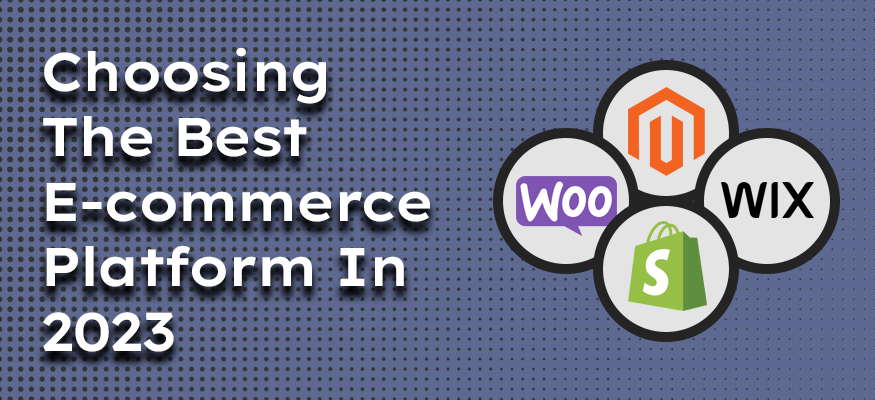E-commerce Growth and Marketshare
It's no secret that e-commerce businesses have taken over the world. It's estimated that by the end of 2023, global retail e-commerce sales will reach $6.3 trillion — and this number is only going to continue to grow. With a rapidly expanding market comes competition — and with competition comes choices. Deciding on which e-commerce platform is best for your business can be a daunting task.
E-commerce platforms are the lifeblood of online retail. From tiny home businesses to multinational giants, these platforms empower firms to sell products online, manage their operations, and interface with customers. With a slew of options available, the question remains: Which e-commerce platform is the best? This article offers an in-depth look at the top e-commerce platforms, dissecting their strengths, weaknesses, and the type of businesses they cater to.
Shopify: The People's Choice
Shopify has become one of the most popular e-commerce platforms globally, and for a good reason. Its ease of use and quick setup time make it a favorite among businesses of all sizes. Whether you're a budding entrepreneur or an established brand, Shopify's versatile ecosystem is designed to cater to your needs.
Pros:
- User-Friendly: No tech degree? No problem. Setting up is a breeze.
- Extensive App Store: From SEO to bookkeeping, there’s an app for everything.
- Integrated Payment System: Shopify Payments eliminates third-party gateways.
Cons:
- Transaction Fees: Additional fees if not using Shopify Payments.
- Limited Customization: While sufficient for most, some find customization limiting.
Best For:
Those seeking a hassle-free setup and a scalable solution, from SMEs to larger enterprises.
WooCommerce: The Customization King
A WordPress plugin at heart, WooCommerce offers unmatched customization. It combines the familiarity of WordPress with the capabilities of a full-fledged e-commerce platform, making it a choice contender for businesses of varying sizes.
Pros:
- Deep Customization: Perfect for businesses with specific needs.
- Cost-Effective: Pay only for what you need.
- Massive Plugin Ecosystem: If you need a feature, there's likely a plugin for it.
Cons:
- Setup Complexity: May require some tech-savviness.
- Maintenance: Regular updates are necessary.
Best For:
WordPress aficionados and businesses needing a highly tailored store.
Adobe Commerce (Magento): The Enterprise Dynamo
A favorite among big businesses, Adobe Commerce boasts extensive features suitable for large-scale operations. Its open-source nature combined with enterprise-grade capabilities makes it a powerhouse in the e-commerce platform arena.
Pros:
- Feature-Rich: Comes loaded with functionalities.
- Highly Scalable: Ideal for rapidly growing businesses.
- Robust Community: Lots of resources, plugins, and community support.
Cons:
- High Costs: The enterprise version can be expensive.
- Complexity: Might require developer expertise.
Best For:
Mid to large businesses or those with an expansive growth plan.
Wix eCommerce: The Newcomer
Wix, traditionally a website builder, has ventured into the e-commerce domain with promising results. Its user-friendly interface combined with a set of integrated e-commerce tools makes it suitable for those starting their online selling journey.
Pros:
- Intuitive Builder: Easily drag, drop, and design.
- Affordable: Ideal for businesses on a budget.
- All-in-One Platform: No need for third-party tools.
Cons:
- Limited Scalability: More suited for small to medium stores.
- Fewer Advanced Features: Some e-commerce specifics might be missing.
Best For:
Startups and small businesses taking their first e-commerce steps.
So Which E-commerce Platform Is Best?
While each platform has its unique strengths, your choice should align with your business needs. Shopify is an all-rounder, catering to a broad range of businesses. WooCommerce offers unparalleled customization, making it ideal for those with specific requirements. Adobe Commerce stands out for larger businesses with growth in mind, while Wix eCommerce is perfect for those who are just starting out.
Ultimately, understanding your business's scale, budget, and technical expertise will guide you to the platform that promises the best return on investment. Whatever your choice, the digital world awaits, brimming with opportunities.

